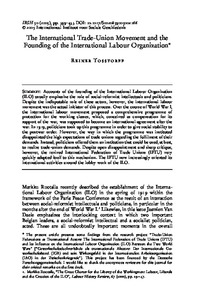The international trade-union movement and the founding of the International Labour Organization

International Review of Social History
2005
50
399-433
history ; ILO ; ILO Constitution ; international trade union ; trade unionism ; trade union role ; WFTU
Trade unionism
http://dx.doi.org/10.1016/10.1017/S0020859005002166
English
Bibliogr.
"Accounts of the founding of the International Labour Organization (ILO) usually emphasize the role of social-reformist intellectuals and politicians. Despite the indisputable role of these actors, however, the international labour movement was the actual initiator of this process. Over the course of World War I, the international labour movement proposed a comprehensive programme of protection for the working classes, which, conceived as compensation for its support of the war, was supposed to become an international agreement after the war. In 1919, politicians took up this programme in order to give social stability to the postwar order. However, the way in which the programme was instituted disappointed the high expectations of trade unions regarding the fulfilment of their demands. Instead, politicians offered them an institution that could be used, at best, to realize trade-union demands. Despite open disappointment and sharp critique, however, the revived International Federation of Trade Unions (IFTU) very quickly adapted itself to this mechanism. The IFTU now increasingly oriented its international activities around the lobby work of the ILO."
Digital
The ETUI is co-funded by the European Union. Views and opinions expressed are however those of the author(s) only and do not necessarily reflect those of the European Union or the ETUI.